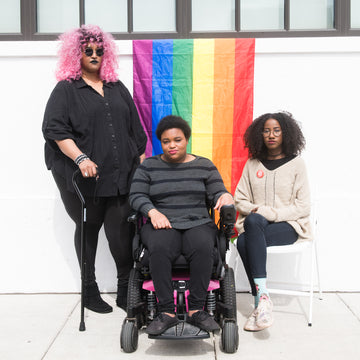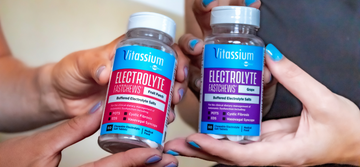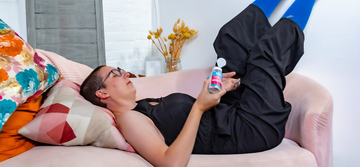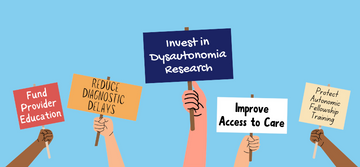
(Photo credit) Disabled And Here (affecttheverb.com)
June is recognized as Pride Month, dedicated to celebrating the pride, resilience, and perseverance of the LBGTQ+ community. It should also be a time to recognize some of the challenges still faced by this community, including social stigma, violence, and access to basic human rights. Although diversity, equity, and inclusion are the main elements of pride, conversations about discrimination in healthcare and chronic illness should be included as well.
Discrimination in the Health Care Setting
“As a young, queer, Black woman, I never knew which of my identifies will work against me when I walk into a hospital or doctor’s office,” says chronic illness advocate and patient Natasha.
The explicit discrimination towards people of color is hurting our society in more than just overt ways. Both conscious prejudices and racism and implicit bias are associated with negative physical and mental health consequences. Although this is becoming more recognized, the LGBTQ+ community is often wrongly excluded and further stigmatized.
A person’s relationship with their individual provider or care team is an important component in both access and consistent quality patient care. People in the LGBTQ+ community have seen higher rates of unmet medical need and care because of cost and are less likely to have a regular provider.
Many LGBTQ+ individuals report negative experiences when seeking care, ranging from disrespectful treatment from healthcare providers and office staff, to providers’ lack of awareness of specific health needs. In a survey of LGB people, more than half of all respondents reported that they have faced cases of providers denying care, using harsh language, or blaming the patient’s sexual orientation or gender identity as the cause for an illness. For the transgender community, barriers to care are often further amplified and include lack of education and awareness, financial barriers, discrimination, lack of cultural competence by providers, health systems barriers and socioeconomic barriers.
Fear of discrimination may lead some people to hide their sexual orientation or gender identity from providers or avoid seeking care altogether.
“I have lied to doctor’s or hid my sexuality because I knew disclosing would not benefit my care, but only opened the possibility for stigma and prejudice,” Graves said. “When I was first diagnosed, I had been admitted to the hospital because of my high heart rate and bronchitis as a result of my POTS and autoimmune diseases.
The Toll of Discrimination on Health Outcomes
In addition to, and because of, not getting the care needed, adults in the LBGTQ+ community are more likely to experience poorer health outcomes and a higher risk of chronic illness and disability than their non-LBGTQ+ counterparts.
Research shows that regardless of gender or sexuality every adverse childhood experience like living in a household with abuse or neglect, single parent household and/or divorce, witnesses violence, or growing up in an environment of mental health or substance abuse issues, all raises the chance of being hospitalized with an autoimmune disease such as hyperthyroidism, lupus, fibromyalgia, rheumatoid arthritis, Crohn’s disease, or celiac disease. The stress that comes from being discriminated against or as a survivor of violence as an LGBTQ+ person can be among the triggers add to this overall toll. The body keeps score, and the consequences can be severe.
Overall, an estimated 3 to 5 million LBGTQ+ people have disabilities. Approximately 36% of women in the LGBTQ+ community and 30% of men in the community also self-identify as people with disabilities. This is almost double as compared to those who are not part of the LGBTQ+ community.
Advocating for the LGBTQ+ Community
There are many ways that members of the LBGTQ+ community can advocate for themselves in a healthcare setting.
“I encourage those in the community to speak up and to teach health care providers what their needs are, “Brielle Winslow-Majette, Deputy Director of Garden State Equality, said. “I encourage members of the LGBTQ+ community to shop around for doctors. Ask questions. Find healthcare providers that are culturally competent and understand the health needs of the community. Ask about their policies and speak up if forms are not inclusive of other sexes or gender."
Allies are also important in helping tackle inequalities in healthcare. As an ally, self-reflection, education and speaking up for those being discriminated against are all ways you can help those in the LGBTQ+ community.







